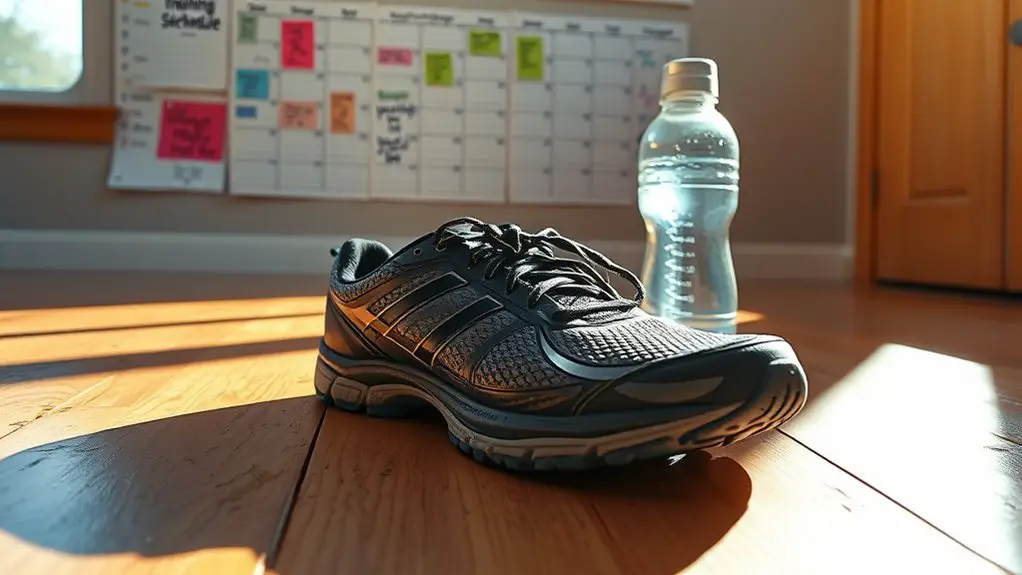To rewire your brain for success in athletics, embrace neuroplasticity by practicing techniques that enhance performance and focus. Use mindfulness to stay present and breathing exercises to calm your mind. Set specific goals to build direction, and apply visualization to mentally rehearse success. Building resilience through challenges helps you recover faster from setbacks. By adopting a growth mindset and celebrating your journey, you'll continue to improve. Discover even more strategies to elevate your athletic performance.
Understanding Neuroplasticity and Its Impact on Performance
When you think about athletic performance, it's easy to focus on physical training, but understanding neuroplasticity is just as essential. Neuroplasticity is your brain's ability to adapt and reorganize itself in response to experiences. This means that every time you practice, you're not just building muscle; you're also rewiring your brain to improve coordination, strategy, and decision-making. By embracing this concept, you can break free from limiting beliefs that hold you back. Visualizing success and engaging in mindful practice can enhance your neural pathways, making it easier to access your athletic potential. Remember, the mind and body work together, and by nurturing both, you open doors to greater freedom and performance in your athletic journey.
Techniques to Enhance Focus and Concentration
To achieve peak performance in athletics, enhancing your focus and concentration is essential, especially amidst distractions. Here are some effective techniques you can use:
| Technique | Description | Benefits |
|---|---|---|
| Mindfulness | Practice being present in the moment. | Reduces anxiety, improves clarity. |
| Visualization | Imagine success before it happens. | Boosts confidence and motivation. |
| Breathing Exercises | Use deep breaths to center yourself. | Calms the mind, enhances focus. |
| Goal Setting | Set specific, achievable goals. | Provides direction and purpose. |
Building Resilience Through Mental Conditioning
Building resilience is essential for athletes facing the inevitable challenges and setbacks in their pursuit of success. To cultivate this mental toughness, you need to embrace adversity as a growth opportunity. When you encounter obstacles, remind yourself that each setback can strengthen your resolve. Practice positive self-talk and focus on your strengths; this will help you bounce back faster. Additionally, develop a routine that incorporates mental conditioning exercises, like mindfulness or stress management techniques. These practices can enhance your ability to remain composed under pressure. Remember, resilience isn't just about enduring; it's about thriving despite difficulties. By training your mind, you'll find the freedom to push past limitations and achieve your athletic goals.
The Role of Visualization in Athletic Success
Although many athletes focus on physical training, incorporating visualization techniques can greatly enhance performance and boost confidence. By vividly imagining yourself succeeding in your sport, you're not just dreaming; you're training your brain. Picture every detail—how it feels to cross the finish line or make that perfect shot. This mental rehearsal primes your mind for actual performance, reducing anxiety and increasing focus.
When you visualize, you activate the same neural pathways used in real-life actions, making them feel more familiar and achievable. Ultimately, this process cultivates a sense of control and freedom, allowing you to break through mental barriers. So, embrace visualization as a powerful tool in your athletic journey and watch your success unfold.
Developing a Growth Mindset for Continuous Improvement
While many athletes believe talent is the key to success, developing a growth mindset can be even more essential for continuous improvement. Embracing this mindset empowers you to view challenges as opportunities, fostering resilience and adaptability in your athletic journey.
To cultivate a growth mindset, consider these strategies:
- Embrace challenges instead of avoiding them.
- Learn from criticism and use it to fuel your growth.
- Celebrate effort over outcome to focus on the process.
- Surround yourself with supportive, growth-oriented individuals.
- Reflect on your progress regularly to track improvements.
Frequently Asked Questions
Can Diet Influence Neuroplasticity in Athletes?
Yes, your diet can influence neuroplasticity. Nutrient-rich foods, particularly omega-3 fatty acids, antioxidants, and vitamins, support brain health, enhancing your ability to adapt and learn, ultimately improving your performance and overall mental resilience.
How Does Sleep Affect Athletic Mental Performance?
While you're dreaming, your brain's busy organizing memories and sharpening skills. Without enough sleep, you'll feel sluggish and unfocused. Prioritize rest to release your potential, transforming fatigue into freedom for peak athletic performance.
What Role Do Genetics Play in Athletic Success?
Genetics play a significant role in athletic success, influencing traits like muscle composition and endurance. While you can develop skills through hard work, understanding your genetic predispositions can help you tailor your training for maximum effectiveness.
Are There Specific Supplements for Brain Performance?
You might think supplements can't boost your brain, but they can help. Omega-3s and adaptogens like Rhodiola can enhance focus and reduce stress, giving you the mental edge you need for greater freedom and performance.
How Can Social Support Impact Athletic Motivation?
Social support boosts your athletic motivation by providing encouragement, accountability, and a sense of belonging. When you surround yourself with supportive people, you'll feel more empowered to pursue your goals and overcome challenges.




